Student Spotlight: Hope Evans

Hope Evans is a second-year graduate student pursuing a master’s degree in public history through the Florida State University Department of History, part of College of Arts and Sciences. In 2022, Evans earned a bachelor’s degree in history with a minor in political science from FSU. She was recently awarded the 2024 Diversity Scholarship from the National Trust for Historic Preservation, which covers the cost of attending PastForward, the organization’s annual conference. Since 2022, Evans has worked with the John Gilmore Riley Center and Museum of African American History and Culture in Tallahassee, and she currently serves as the museum’s education director and curatorial assistant. Her interests focus on historic preservation and architectural history, and she is set to graduate in Spring 2025.
Tell us about your background, where you’re from, and what brought you to FSU.
I’m originally from Plant City, Florida. After earning my bachelor’s degree, I took a year off to work at the Riley Museum. In my current role as the education director and curatorial assistant, I have gained invaluable experience and developed a deeper passion for historical education and research. When it came time to choose a graduate program, choosing FSU was an easy decision; I loved the history department as an undergraduate student and always felt very supported by incredible guidance from my professors.
What inspired you to pursue a degree in public history?
I always loved my history classes in school and particularly remember falling in love with history in my eighth-grade American history class. My interest in history was greatly influenced by forms of public history aimed at girls, such as American Girl Dolls and the Nancy Drew video games. I really enjoy the mix of history and community that public history offers.
How did you get involved with the Riley Museum, and what drew you to this role?
The Riley Museum reached out to the Department of History to find someone for a part-time role. Katherine Mooney, the associate chair for graduate studies and James P. Jones professor of history, brought this opportunity to my attention. After meeting with the museum staff, I became very interested in the alternative form of teaching that a museum job can offer where visitors learn through hands-on exhibits and activities.
Can you describe your responsibilities as the education director and curatorial assistant at the Riley Museum?
Being a small-house museum, we all take on multiple roles. Our mission is to preserve African American history and culture through education and engagement, focusing on both preserving and presenting the community’s rich history. Over the past two years, I’ve curated exhibits, guided tours, created lesson plans, led our summer camp, and worked on various projects, including a children’s book, coffee table book, and exhibit panels. My research includes gathering historical data, conducting interviews, and analyzing archival materials to create impactful educational exhibits. For instance, while documenting the old Smitty’s Club in Tallahassee for a research paper, I analyzed its importance as a popular nightlife spot for dancing, drinking and live music. Initially, it served local African Americans, and later, in the mid-to-late 20th century, it became a favorite venue for the predominately white local alternative scene. Oral histories were crucial in piecing together its history, the eagerness of the community to preserve the club’s legacy made me realize just how vital the historical preservation of physical sites is to communities that have historically lacked resources. Preservation involves a blend of community engagement and rigorous research, and I’m deeply invested in making the history of these sites as inclusive and accessible as possible.
Can you tell us about the Diversity Scholarship from the National Trust for Historic Preservation?
I’m honored to be a recipient for the scholarship. As a Diversity Scholar, this program will give me the chance to meet and learn from a variety of speakers and participate in workshops on historic preservation topics, such as climate adaptation and community development. Additionally, I will attend bimonthly virtual convenings that offer practical guidance in historic preservation and provide networking opportunities.
What is the most rewarding aspect of your job?
The most rewarding aspect has been the community’s response, particularly in curating our exhibition series. Hearing locals share their memories of Tallahassee and watching them connect with our exhibits in such a personal way is truly special. Additionally, working on our children's book, “Luke and Leila’s Tallahassee Adventure,” was very rewarding. I had creative freedom in research, writing and sketching, and it was exciting to see my ideas and sketches brought to life.
Were there any faculty or staff members that have helped or inspired you?
I consider myself incredibly lucky to have had amazing mentors at FSU. Mooney, along with associate professor of history Claudia Liebeskind, inspired me to pursue graduate school and provided invaluable resources. Assistant professor of history Kathleen Powers Conti connected me with numerous opportunities and supported me as a young professional. Their unwavering support has profoundly influenced my academic, career and personal life.
What are some current goals or projects that you’re working on?
I recently became the communications officer for the History Graduate Student Association. Currently, I’m finalizing my paper that was accepted by the Southeast Chapter of the Society of Architectural Historians’ annual conference. I’m also in the process of writing a book review for a peer-reviewed journal.
What are you looking forward to most after you graduate?
I hope to pursue a career in historic preservation and architectural history once I graduate. I’m looking forward to getting familiarized with the community through my work, wherever that may be.
What advice would you give to other students?
You don’t need to have your entire life mapped out by the time you graduate. For me, taking time off from school was crucial to discovering my interests and passions beyond being a student. It’s okay to try new things and to be wrong about what you thought you would enjoy.
